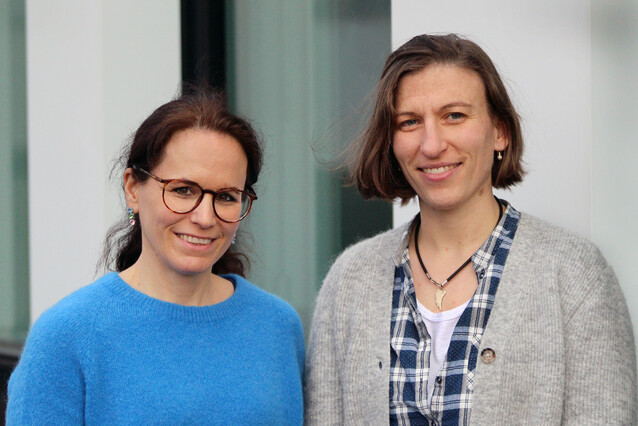FWF funding for Daniela Pollak and Franziska Lorbeer
Two scientists with IMP-ties secured competitive funding from the Austrian Science Fund (FWF). Franziska Lorbeer, a postdoc in Alexander Stark’s lab since 2020, was awarded an ESPRIT Fellowship. Daniela Pollak, IMP adjunct investigator and head of comparative medicine of IMP and the Institute of Molecular Biotechnology (IMBA) since 2023, received a stand-alone grant.
How transcriptional bursts are regulated
With the funding, Franziska Lorbeer will combine experimental and computational approaches to study how regulatory DNA elements and their partner proteins, transcription factors (TFs) and cofactors (COFs), regulate gene expression on the level of transcriptional bursting—the process by which RNA is produced discontinuously. Her research will explore how DNA sequences and protein interactions influence the size and frequency of these bursts, affecting gene expression levels and expression differences between cells. Using her newly developed bulk allele resolution (BARe)-seq technology, Lorbeer will test around 1,000 DNA sequences and protein interactions in large-scale experiments to understand how transcriptional bursts are encoded. This work will shed light on the fundamental mechanisms of transcriptional bursting and how it shapes the differences between cell types.
Franziska Lorbeer earned her PhD in Molecular and Cell Biology at the University of California, Berkeley, where she worked under the supervision of Dirk Hockemeyer, studying telomerase and telomere length regulation in human disease. In 2020, she joined the IMP as a postdoc in the lab of Alexander Stark. Her current research focuses on understanding the molecular mechanisms of transcriptional bursting by examining how it is regulated at both the sequence and protein levels. Lorbeer has received several prestigious awards and fellowships, including the EMBO Postdoctoral Research Fellowship (2022), the VIP2 Postdoc Fellowship of the Vienna BioCenter (2020), and the Boehringer Ingelheim PhD Fellowship (2016).
How the immune system affects maternal behaviour
With the stand-alone grant from the FWF, Daniela Pollak will study how the activation of the immune system during pregnancy impacts the female brain and influences maternal behavior in mice. Her research will focus on understanding how immune responses alters brain circuits and the molecular pathways that control maternal care. Using advanced genetic approaches, she will monitor brain activity in response to immune activation during pregnancy. Pollak will also use single-cell analysis to understand the molecular changes at play at the individual cell level. The project aims to show how immune activation during pregnancy affects the brain’s ability to prepare for parenting, with potential insights into how infections, including COVID-19, could impact long-term maternal behaviour.
Daniela Pollak earned her Doctor of Veterinary Medicine (DVM) degree at the Veterinary University of Vienna and her PhD at the Medical University of Vienna. She conducted her postdoctoral research in the laboratory of Nobel laureate Eric Kandel at Columbia University in New York, where she studied the neural basis of behaviour. Upon returning to Vienna, Pollak joined the Medical University of Vienna, where she is now a Professor of Behavioral Biology. In 2023, she became head of comparative medicine of IMP and IMBA and an adjunct investigator at the IMP. Her research focuses on studying the neural circuits, cellular mechanisms, and molecular processes that govern social and emotional behaviours in both health and disease.
About FWF funding
The Austrian Science Fund (FWF) is Austria's central funding organisation for basic research. The ESPRIT program (Early-Stage Program: Research - Innovation - Training) is a funding initiative by the FWF designed to support the professional development of early-career researchers. It offers postdoctoral researchers the chance to lead independent research projects across all disciplines, helping them establish their research profiles. The program provides funding for up to three years. FWF Stand-alone grants are allocated to fund individual research in the area of non-profit oriented basic research. They are assigned solely based on their high quality, assessed by international referees on a competitive basis. The current approval rate for stand-alone projects is 26.6 percent.
Further Reading
Lab of Alexander Stark
Lab of Daniela Pollak
